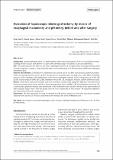DSpace Repository
A Novel Approach for Solving Quadratic Fractional Programming Problems
- DSpace Home
- →
- Web Of Science
- →
- Web Of Science
- →
- View Item
JavaScript is disabled for your browser. Some features of this site may not work without it.
| dc.contributor.author | Gemicİ, Eyup
|
|
| dc.date.accessioned | 2024-04-18T07:50:23Z | |
| dc.date.available | 2024-04-18T07:50:23Z | |
| dc.date.issued | 2018 | |
| dc.identifier.issn | 1848-0225 | |
| dc.identifier.issn | 1848-9931 | |
| dc.identifier.uri | http://hdl.handle.net/11547/11536 | |
| dc.description.abstract | Introduction: Gastroesophageal reflux is a major problem after sleeve gastrectomy. There is still insufficient understanding of how it occurs and whether it is due to the sphincter length, relaxation, or pressure differences. Aim: This study evaluates the effect on the lower esophageal sphincter of the laparoscopic sleeve gastrectomy (LSG) technique applied in surgery in cases of morbid obesity using ambulatory 24-h pH monitoring (APM) and esophageal manometry (EM). Material and methods: A retrospective examination was carried out on the APM and EM tests performed preoperatively and postoperatively in cases of LSG. The parameters examined were the body mass index (BMI), amplitude pressure of the esophagus (AP), total length of the lower esophageal segment (LESL), resting pressure of the LES (LESP), residual pressure of the LES (LESR), relaxation time of the LES, intragastric pressure, and the DeMeester score. Results: A total of 62 cases with available data were evaluated. A statistically significant difference was determined between the preoperative values and the 3-month postoperative values of BMI, LESP, and relaxation time of the LES. A statistically significant increase was determined in the DeMeester score, and the increase in the total number of reflux episodes longer than 5 min was found to be the most responsible for this increase. No significant difference was determined in the other parameters. Conclusions: The LSG was found to cause a reduction in LESP, and an increase in acid reflux causing an extended relaxation time of the LES. This was confirmed by the increase seen in the DeMeester score. | tr_TR |
| dc.language.iso | en | tr_TR |
| dc.relation.ispartofseries | 9;2 | |
| dc.title | A Novel Approach for Solving Quadratic Fractional Programming Problems | tr_TR |
| dc.type | Article | tr_TR |
Files in this item
This item appears in the following Collection(s)
-
Web Of Science [1030]
